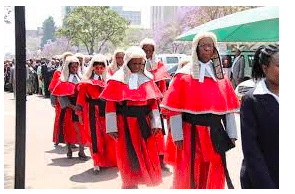By John Moono

The Judiciary of Zambia is an independent arm of the government. Under clause 118 (2) of the Constitution of Zambia, in exercising judicial authority, the courts shall be guided by the following principles: justice shall be done to all, without discrimination, justice shall not be delayed; adequate compensation shall be awarded, where payable; alternative forms of dispute resolution mechanisms, shall be promoted, subject to clause (3); justice shall be administered without undue regard to procedural technicalities; and the values and principles of the constitution shall be protected and promoted as according to the enshrinement in the Constitution of Zambia (1996). Based on this enshrinement, the 2016 constitution amendment had the foundation on which it was founded and continuation of the protection of the supreme law of the land
According to the Constitutional Amendment of Act No. 2 of (2016) states that the Zambian court structure shall comprise the Supreme Court with an equal ranking to the Constitutional Court, The Court of Appeals, and the High Court with equal ranking as the Industrial Relations Court, the Subordinate or Magistrate Court, the Small Claims Court, the Local Court and such lower Courts as may be prescribed by an Act of Parliament. The judiciary has been tasked to administer justice through resolving disputes between individuals or between individual and the state, interpreting the constitution and the laws of Zambia, promoting the rule of law, and protecting the human rights of individuals and groups.
The Supreme Court of Zambia is the highest and final court of appeal and has the final say in all legal matters, except for matters that are handled by the Constitutional court. It is headed by the Chief Justice and the Deputy Chief Justice. The court also helps in the interpretation of the constitution.
Constitutional Amendment of Act No. 2 of (2016) contends that The Constitutional Court is also the highest and final court of appeal for all matters pertaining to the constitution and electoral matters. The court is mandated to pass final interpretation of the constitution and all electoral matters. The court is headed by the President of the Constitutional Court. Both the Judges from the Supreme and Constitutional Courts are appointed by the Republican President on advice from the Judicial Service Commission.
The High Court of Zambia have unlimited and original jurisdiction to hear and determine any civil or criminal proceedings under any law and such jurisdiction and power as may be conferred on it by the constitution or any other law. The exception is in the field of industrial relations, in which the industrial relations has exclusive jurisdiction. The High Court is a superior court of record and has jurisdiction to supervise and direct any civil or criminal proceedings taking place before any Subordinate Court. This court can be categorized into the family, business court and industrial relations. The family court deals with matters pertaining to family law, the business court deals with all civil and criminal matters and the industrial relations deals with all labour related matters.
Furthermore, the Industrial Relations Court has original and exclusive jurisdiction in all industrial relations matters, involving into and making decisions in collective disputes, interpreting the terms of the collective agreements and recognition agreements, and adjudicating upon any matters affecting the collective rights, obligations and privileges of employees, employers and representative organizations. The court is headed by the Chairperson, Deputy Chairperson and not more than ten members as the Minister of Labour and Social Security may appoint.
In addition, the court structure in Zambia cannot be complete without the mention of the Subordinate Court. This is the lower court and the court of first instance and is graded as first, second and third class. The Subordinate Court can decide all matters except for offences of treason, murder, aggravated robbery, election petitions and all matters that involve the interpretation of the constitution and the court is preside over by the Resident Magistrate.
The Ministry of Justice (2016) records that the Small Claims Court deal with minor financial claims that are usually less twenty thousand kwacha except in certain circumstances. The circumstances in question may include damages in respect of defamation, malicious prosecution, wrongful imprisonment, wrongful arrest, adultery and seduction claims concerning the validity of a will and claims made under the customary law.
The Ministry of Justice (2016) says that the Local Court operate within territorial limits and are grade A or grade B according to the value of the claims they can consider. They also limited in terms of the severity of the sentences they can impose.
Ministry of Justice (2016) records that The Court of Appeal is established under Article 130 of the Constitution of Zambia Act No. 2 of 2016. It is now the second highest Superior Court of Record after the Supreme Court and Constitutional Court of Zambia. Under Article 130 of the Constitution as read with the Superior Courts Act No. 9 of 2016, the Court of Appeal is composed of the Judge President, the Deputy Judge President and seventeen Court of Appeal Judges. However, the composition was revised to as follows: the Judge President and the Deputy Judge President plus ten other judges. The jurisdiction of the court is to hear appeals from the High Court, quasi-judicial bodies, except a local government election and other courts, except for matters under the exclusive jurisdiction of the Constitutional Court.
The judiciary being the independent arm of the Government of the Republic of Zambia is mandated to administer justice at all levels of the society and it is the guiding principle to the protection of human rights. The court structure has been guided by the constitutional amendment of 2016 which gave rise to the Constitutional Court which is of equal ranking as the Supreme Court and the Court of Appeal which is the second highest court after the aforementioned courts.




